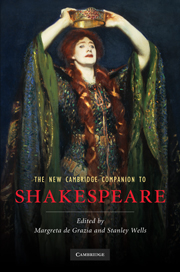Book contents
- Frontmatter
- 1 The traces of Shakespeare’s life
- 2 Shakespeare’s reading
- 3 Shakespeare’s writing: from manuscript to print
- 4 The theatre of Shakespeare’s London
- 5 The transmission of Shakespeare’s texts
- 6 Shakespeare and language
- 7 Shakespeare the poet
- 8 Shakespeare’s comedies
- 9 Shakespeare’s tragedies
- 10 Shakespeare’s English history plays
- 11 Shakespeare’s classical plays
- 12 Shakespeare’s tragicomedies
- 13 Shakespeare, religion and politics
- 14 Shakespeare and race
- 15 Shakespeare, sexuality and gender
- 16 Shakespeare on the stage
- 17 The critical reception of Shakespeare
- 18 Shakespeare and popular culture
- 19 Shakespeare and globalization
- 20 Shakespeare and media history
- 21 Shakespeare: reading on
- Index
4 - The theatre of Shakespeare’s London
Published online by Cambridge University Press: 28 January 2011
- Frontmatter
- 1 The traces of Shakespeare’s life
- 2 Shakespeare’s reading
- 3 Shakespeare’s writing: from manuscript to print
- 4 The theatre of Shakespeare’s London
- 5 The transmission of Shakespeare’s texts
- 6 Shakespeare and language
- 7 Shakespeare the poet
- 8 Shakespeare’s comedies
- 9 Shakespeare’s tragedies
- 10 Shakespeare’s English history plays
- 11 Shakespeare’s classical plays
- 12 Shakespeare’s tragicomedies
- 13 Shakespeare, religion and politics
- 14 Shakespeare and race
- 15 Shakespeare, sexuality and gender
- 16 Shakespeare on the stage
- 17 The critical reception of Shakespeare
- 18 Shakespeare and popular culture
- 19 Shakespeare and globalization
- 20 Shakespeare and media history
- 21 Shakespeare: reading on
- Index
Summary
Actors
Hamlet, excited at having just successfully extemporized a verse, turns to his friend Horatio, asking 'Would not this . . . get me a fellowship in a cry of players, sir?' Horatio is less impressed. He thinks it would win Hamlet only 'half a share', but Hamlet is adamant: 'A whole one, I' (3.2.253-7). The exchange works on a number of levels. Hamlet is delighted that he has the improvisational skill of an actor; the irony is, of course, that Hamlet is actually able to 'act' only in this performative sense, while in reality, as he recognizes elsewhere, he can merely 'unpack my heart with words' (2.2.563). But the conversation also references the structure of an early modern acting company. 'Cries' or troupes were set up by 'sharers' who contributed to them two separate but equally important qualities: acting talent and money. Thus Hamlet thinks his skills alone should earn him a 'share' in a company, while Horatio thinks they merit only half that right.
Shakespeare himself was a full 'sharer' in a company known first as the Lord Chamberlain's Men (1594-6; 1597-1603) and later as the King's Men (1603-1642). This meant that Shakespeare was bound to be performance-focused, for it was at the end of a day's playing that the money taken at the doors of entrance was 'parcel'd out upon the sharing-board' - placed upon a table and distributed among the sharers. And, as theatrical income was specifically linked to performance, then if plague closed the theatre, or fire destroyed it, Shakespeare would make no money, and nor would anyone else.
- Type
- Chapter
- Information
- The New Cambridge Companion to Shakespeare , pp. 45 - 60Publisher: Cambridge University PressPrint publication year: 2010

